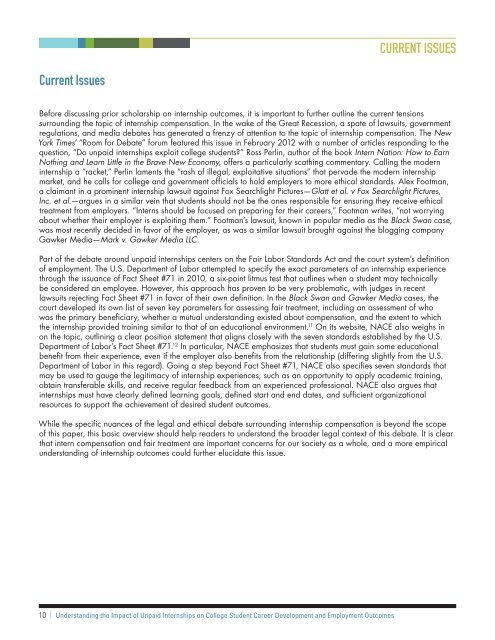the-impact-of-unpaid-internships-on-career-development
the-impact-of-unpaid-internships-on-career-development
the-impact-of-unpaid-internships-on-career-development
Create successful ePaper yourself
Turn your PDF publications into a flip-book with our unique Google optimized e-Paper software.
CURRENT ISSUES<br />
Current Issues<br />
Before discussing prior scholarship <strong>on</strong> internship outcomes, it is important to fur<str<strong>on</strong>g>the</str<strong>on</strong>g>r outline <str<strong>on</strong>g>the</str<strong>on</strong>g> current tensi<strong>on</strong>s<br />
surrounding <str<strong>on</strong>g>the</str<strong>on</strong>g> topic <str<strong>on</strong>g>of</str<strong>on</strong>g> internship compensati<strong>on</strong>. In <str<strong>on</strong>g>the</str<strong>on</strong>g> wake <str<strong>on</strong>g>of</str<strong>on</strong>g> <str<strong>on</strong>g>the</str<strong>on</strong>g> Great Recessi<strong>on</strong>, a spate <str<strong>on</strong>g>of</str<strong>on</strong>g> lawsuits, government<br />
regulati<strong>on</strong>s, and media debates has generated a frenzy <str<strong>on</strong>g>of</str<strong>on</strong>g> attenti<strong>on</strong> to <str<strong>on</strong>g>the</str<strong>on</strong>g> topic <str<strong>on</strong>g>of</str<strong>on</strong>g> internship compensati<strong>on</strong>. The New<br />
York Times’ “Room for Debate” forum featured this issue in February 2012 with a number <str<strong>on</strong>g>of</str<strong>on</strong>g> articles resp<strong>on</strong>ding to <str<strong>on</strong>g>the</str<strong>on</strong>g><br />
questi<strong>on</strong>, “Do <str<strong>on</strong>g>unpaid</str<strong>on</strong>g> <str<strong>on</strong>g>internships</str<strong>on</strong>g> exploit college students?” Ross Perlin, author <str<strong>on</strong>g>of</str<strong>on</strong>g> <str<strong>on</strong>g>the</str<strong>on</strong>g> book Intern Nati<strong>on</strong>: How to Earn<br />
Nothing and Learn Little in <str<strong>on</strong>g>the</str<strong>on</strong>g> Brave New Ec<strong>on</strong>omy, <str<strong>on</strong>g>of</str<strong>on</strong>g>fers a particularly scathing commentary. Calling <str<strong>on</strong>g>the</str<strong>on</strong>g> modern<br />
internship a “racket,” Perlin laments <str<strong>on</strong>g>the</str<strong>on</strong>g> “rash <str<strong>on</strong>g>of</str<strong>on</strong>g> illegal, exploitative situati<strong>on</strong>s” that pervade <str<strong>on</strong>g>the</str<strong>on</strong>g> modern internship<br />
market, and he calls for college and government <str<strong>on</strong>g>of</str<strong>on</strong>g>ficials to hold employers to more ethical standards. Alex Footman,<br />
a claimant in a prominent internship lawsuit against Fox Searchlight Pictures—Glatt et al. v Fox Searchlight Pictures,<br />
Inc. et al.—argues in a similar vein that students should not be <str<strong>on</strong>g>the</str<strong>on</strong>g> <strong>on</strong>es resp<strong>on</strong>sible for ensuring <str<strong>on</strong>g>the</str<strong>on</strong>g>y receive ethical<br />
treatment from employers. “Interns should be focused <strong>on</strong> preparing for <str<strong>on</strong>g>the</str<strong>on</strong>g>ir <strong>career</strong>s,” Footman writes, “not worrying<br />
about whe<str<strong>on</strong>g>the</str<strong>on</strong>g>r <str<strong>on</strong>g>the</str<strong>on</strong>g>ir employer is exploiting <str<strong>on</strong>g>the</str<strong>on</strong>g>m.” Footman’s lawsuit, known in popular media as <str<strong>on</strong>g>the</str<strong>on</strong>g> Black Swan case,<br />
was most recently decided in favor <str<strong>on</strong>g>of</str<strong>on</strong>g> <str<strong>on</strong>g>the</str<strong>on</strong>g> employer, as was a similar lawsuit brought against <str<strong>on</strong>g>the</str<strong>on</strong>g> blogging company<br />
Gawker Media—Mark v. Gawker Media LLC.<br />
Part <str<strong>on</strong>g>of</str<strong>on</strong>g> <str<strong>on</strong>g>the</str<strong>on</strong>g> debate around <str<strong>on</strong>g>unpaid</str<strong>on</strong>g> <str<strong>on</strong>g>internships</str<strong>on</strong>g> centers <strong>on</strong> <str<strong>on</strong>g>the</str<strong>on</strong>g> Fair Labor Standards Act and <str<strong>on</strong>g>the</str<strong>on</strong>g> court system’s definiti<strong>on</strong><br />
<str<strong>on</strong>g>of</str<strong>on</strong>g> employment. The U.S. Department <str<strong>on</strong>g>of</str<strong>on</strong>g> Labor attempted to specify <str<strong>on</strong>g>the</str<strong>on</strong>g> exact parameters <str<strong>on</strong>g>of</str<strong>on</strong>g> an internship experience<br />
through <str<strong>on</strong>g>the</str<strong>on</strong>g> issuance <str<strong>on</strong>g>of</str<strong>on</strong>g> Fact Sheet #71 in 2010, a six-point litmus test that outlines when a student may technically<br />
be c<strong>on</strong>sidered an employee. However, this approach has proven to be very problematic, with judges in recent<br />
lawsuits rejecting Fact Sheet #71 in favor <str<strong>on</strong>g>of</str<strong>on</strong>g> <str<strong>on</strong>g>the</str<strong>on</strong>g>ir own definiti<strong>on</strong>. In <str<strong>on</strong>g>the</str<strong>on</strong>g> Black Swan and Gawker Media cases, <str<strong>on</strong>g>the</str<strong>on</strong>g><br />
court developed its own list <str<strong>on</strong>g>of</str<strong>on</strong>g> seven key parameters for assessing fair treatment, including an assessment <str<strong>on</strong>g>of</str<strong>on</strong>g> who<br />
was <str<strong>on</strong>g>the</str<strong>on</strong>g> primary beneficiary, whe<str<strong>on</strong>g>the</str<strong>on</strong>g>r a mutual understanding existed about compensati<strong>on</strong>, and <str<strong>on</strong>g>the</str<strong>on</strong>g> extent to which<br />
<str<strong>on</strong>g>the</str<strong>on</strong>g> internship provided training similar to that <str<strong>on</strong>g>of</str<strong>on</strong>g> an educati<strong>on</strong>al envir<strong>on</strong>ment. 11 On its website, NACE also weighs in<br />
<strong>on</strong> <str<strong>on</strong>g>the</str<strong>on</strong>g> topic, outlining a clear positi<strong>on</strong> statement that aligns closely with <str<strong>on</strong>g>the</str<strong>on</strong>g> seven standards established by <str<strong>on</strong>g>the</str<strong>on</strong>g> U.S.<br />
Department <str<strong>on</strong>g>of</str<strong>on</strong>g> Labor’s Fact Sheet #71. 12 In particular, NACE emphasizes that students must gain some educati<strong>on</strong>al<br />
benefit from <str<strong>on</strong>g>the</str<strong>on</strong>g>ir experience, even if <str<strong>on</strong>g>the</str<strong>on</strong>g> employer also benefits from <str<strong>on</strong>g>the</str<strong>on</strong>g> relati<strong>on</strong>ship (differing slightly from <str<strong>on</strong>g>the</str<strong>on</strong>g> U.S.<br />
Department <str<strong>on</strong>g>of</str<strong>on</strong>g> Labor in this regard). Going a step bey<strong>on</strong>d Fact Sheet #71, NACE also specifies seven standards that<br />
may be used to gauge <str<strong>on</strong>g>the</str<strong>on</strong>g> legitimacy <str<strong>on</strong>g>of</str<strong>on</strong>g> internship experiences, such as an opportunity to apply academic training,<br />
obtain transferable skills, and receive regular feedback from an experienced pr<str<strong>on</strong>g>of</str<strong>on</strong>g>essi<strong>on</strong>al. NACE also argues that<br />
<str<strong>on</strong>g>internships</str<strong>on</strong>g> must have clearly defined learning goals, defined start and end dates, and sufficient organizati<strong>on</strong>al<br />
resources to support <str<strong>on</strong>g>the</str<strong>on</strong>g> achievement <str<strong>on</strong>g>of</str<strong>on</strong>g> desired student outcomes.<br />
While <str<strong>on</strong>g>the</str<strong>on</strong>g> specific nuances <str<strong>on</strong>g>of</str<strong>on</strong>g> <str<strong>on</strong>g>the</str<strong>on</strong>g> legal and ethical debate surrounding internship compensati<strong>on</strong> is bey<strong>on</strong>d <str<strong>on</strong>g>the</str<strong>on</strong>g> scope<br />
<str<strong>on</strong>g>of</str<strong>on</strong>g> this paper, this basic overview should help readers to understand <str<strong>on</strong>g>the</str<strong>on</strong>g> broader legal c<strong>on</strong>text <str<strong>on</strong>g>of</str<strong>on</strong>g> this debate. It is clear<br />
that intern compensati<strong>on</strong> and fair treatment are important c<strong>on</strong>cerns for our society as a whole, and a more empirical<br />
understanding <str<strong>on</strong>g>of</str<strong>on</strong>g> internship outcomes could fur<str<strong>on</strong>g>the</str<strong>on</strong>g>r elucidate this issue.<br />
10 | Understanding <str<strong>on</strong>g>the</str<strong>on</strong>g> Impact <str<strong>on</strong>g>of</str<strong>on</strong>g> Unpaid Internships <strong>on</strong> College Student Career Development and Employment Outcomes



